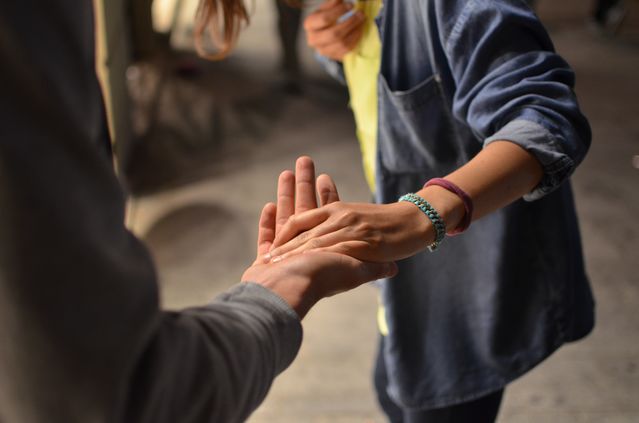
Trauma
Transcending Barriers while Life Meets Death
Reflections on an account of death and connection
Posted February 20, 2018
In this time, so full of pain and challenge, I was unexpectedly nourished by an email I received from someone who is consciously, purposefully trying to live applied NVC and Conflict Transformation in work and life, currently doing it in Eastern Sri Lanka. I am sharing an abridged version of her words here, with her permission, because I continue to be inspired and transformed repeatedly by her description of an encounter with a strange man dying of a violent act. I bolded the part that is most inspiring to me, in case you want to go straight there.
Dear Miki
A man was stabbed [here in Sri Lanka]. I didn’t see it, but heard all the shouting. No one would attend to him, I know this, it’s too risky for locals, they will be targeted for ‘helping the enemy’, so I ran to him, tried to stop the bleeding. But he bled out, there, on the ground, in my arms.
And as I restore myself after a week of a variety of forms of violence, I think of the man who died in my arms.
...I got to be with a human in his final moments of being alive in this form. I held him. Stranger and stranger together, meeting for the first time, for the most real moment two humans could ever experience. We held each other in our eyes. In this tragic act we were reunited from the myth of separation that this world has brought between us, making us think we are separate just because we didn’t meet yet and lived different lives with different languages and countries and religions, making us disconnected from the truth that, even as strangers, we need each other for our survival and wellbeing.
In these final moments of our life forms meeting, we liberated ourselves, restored and rehumanized ourselves beyond the conditioning.
Sometimes I need reminding not to try to understand it all with my mind, and just be here, among it, part of it.

Reading this, I noticed my heart open and open to something that felt like a secret being revealed, as if a little piece of the sacredness of life was shown to me, or maybe an imperceptible healing of some of our collective trauma of separation.
And then…
Since I decided to share this, I’ve had another exchange about it with someone else, who brought to the foreground another layer of complexity: that there’s no way of knowing what the dying man’s experience was; that this was an even more significant moment for him, and any statement about what he was experiencing in some way could be dishonoring of him and of the mystery of his life. I’ve reflected on this for a while now, wondering to myself just how much we can know or intuit about another person’s experience without explicitly naming it with them, which obviously isn’t possible in the moments that the email described.
I welcome this reminder about how little we ultimately know. How much harm has been done in the name of knowing a truth, however beautiful that truth might appear. I want to embrace humility even when it seems, as I know it did to the woman who wrote to me, that the experience was so clear and fully shared. And I am including this reminder here to encourage us all to do so.
The woman who wrote to me also grappled with another theme I want to highlight: how can any of us live with the amount of pain that keeping our eyes open inevitably exposes within and around us? She said:
How do you, we, hold the pain. We do. I see that you do. I see that you have found your way. This inspires me to ‘be me’. After years of believing that being heartbroken again and again means I’m not living with it, I’m not ‘coping’, I’m falling short somehow, I now see that allowing myself to be heartbroken, fully, without resistance, walking forward into more, is me living with the pain. And that feels good!
Humility and heartbreak, so apt for our times of anguish and uncertainty.
May our lives support us in breaking open to pain, all around us, so we can be more alive, so we can meet life fully, so we have a chance to be fully ourselves, till the last moments, without knowing.

